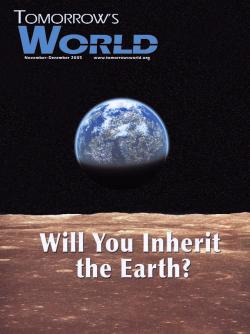The Return of Religion
It was not that long ago that secularism appeared to be the "wave of the future." Why have so many returned to religion—and what does this portend for the years ahead?
In the closing decades of the 20th century, religion re-emerged as a contentious issue in country after country. As Harvard University's Samuel Huntington observed: "The late 20th century has seen the global resurgence of religions around the world" (The Clash of Civilizations, p. 64). Karen Armstrong, a former nun and best-selling author, wrote: "One of the most startling developments of the late 20th century has been the emergence within every major religious tradition of a militant piety known as 'fundamentalism'… this religious resurgence has taken many observers by surprise" (The Battle for God, p. ix).
The new wave of religious activism is driven by serious believers of many faiths—Protestants, Catholics, Jews, Muslims, Hindus and others—all of whom are adamantly opposed to many of the values commonly accepted by modern secular society. Though their specific beliefs differ, they share the ultimate goal of restructuring society on the basis of scriptural belief and practice.
French researcher Gilles Kepel, in his book The Revenge of God, has carefully documented this largely unexpected turn of events. The simultaneous appearance of fundamentalist religious movements on a global scale has major implications for the 21st century, which according to Huntington, "is dawning as a century of religion" (Who Are We?, p. 15). Mankind is witnessing a major shift in the course of human history, and is moving along a path foretold long ago in the pages of the Bible. Bible prophecies indicate that even greater surprises will erupt on the world scene in the years just ahead!
False Assumptions
Secular leaders and scholars have been surprised by the resurgence of religion, because they put their faith in the assumption that modernization would lead to secularization and to the decline of religion. This idea—the so-called "secularization theory"—is widely accepted in academic and political circles. It assumes that as societies modernize and become more secular, religion will wither away as an archaic and useless branch of knowledge. Their assumption was that if religion became irrelevant, and human beings became more reasonable, they would dwell together in peace and happiness in a modernized world.
However, human history did not follow this "reasonable" path to a secular utopia. The closing decades of the 20th century "provide a massive falsification of the idea" that modernization and secularization will lead to a decline in religion. Instead, we are witnessing a massive upsurge in religion around the world (The Desecularization of the World: Resurgent Religion and World Politics, Berger, p. 6). This resurgence of religion has also played a part in an increasing number of violent conflicts around the world. Secular intellectuals and elites have been shocked by this development, because it is proving that their fundamental assumptions about human beings and human society are absolutely wrong! The modern secular notion that religion is archaic and irrelevant has caused many to overlook the importance of religion in human affairs. As a result, they have been taken by surprise by the return of religion. As Peter Berger, one of the world's leading sociologists of religion, wrote: "Those who neglect religion in their analysis of contemporary affairs do so at great peril" (Berger, p. 18). But what has spawned the modern revival of religion, and the spreading rejection of secular society?
Fundamental Reasons
Growing numbers of people around the globe are becoming disenchanted with the effect of secularism on our modern world—the fragmentation of society, the weakening of social cohesion, the absence of noble ideals worth pursuing, the lack of solid values, the social acceptance of what was formerly considered perversion, the spread of crime and the lack of effective punishment, the emptiness of consumerism and materialism, the breakdown of the "welfare state," the failure of communism, the chaos in schools and the breakdown of families (Kepel, p. 5).
Once-formidable ideologies have been found unsatisfactory and have even collapsed. Millions are abandoning the depressing philosophical wasteland of theories that consider human beings mere animals with no future beyond death, and no purpose in life other than to survive. In place of communism and consumerism, many are searching for "new sources of identity, new forms of stable community, and new sets of moral precepts to provide them with a sense of meaning and purpose… there is a quest for some higher explanations about man's purpose, about why we are here" (The Clash of Civilizations, p. 97).
The final decades of the 20th century demonstrated dramatically that man does not live by reason alone, and that human beings need a transcendent purpose in life, solid moral guidelines and a clear sense of identity. Secular science and philosophy have not provided convincing answers to life's fundamental questions and basic human needs. As a result, we are seeing more and more of a rejection of the secular, and a return to the sacred, because people find in religion some compelling answers to the most important questions about human existence. This global resurgence of religion has a profound significance that few today even begin to recognize.
What Prophecy Reveals
More than 25 percent of the Bible is prophecy—much of which refers to the time of the end, leading up to Jesus Christ's return to this earth. Many prophecies reveal that the end of this age will be a time of great religious activity. Jesus told His disciples to watch for specific events that would indicate His return was near. One of those signs would be the appearance of many false teachers who would deceive many by showing "great signs and wonders" (Matthew 24:3–5, 24). Jesus also foretold that the true gospel of the Kingdom of God "will be preached in all the world as a witness to all nations, and then the end will come" (Matthew 24:14). Jesus was speaking of recognizable religious events that would arise on a global scale.
The Apostle Paul prophesied: "In the last days, perilous times will come: for men will be lovers of themselves, lovers of money… lovers of pleasure rather than lovers of God, having a form of godliness but denying its power" (2 Timothy 3:1–3). Paul's words show that, at the end of the age, people will maintain a façade or an appearance of religion, but will deny truths and practices that God deems necessary to true biblical religion. Paul foretold that, at the time of the end, there will be a great "falling away" from true biblical religion, and that in its place a prominent religious figure of global stature will promote an ecumenical movement to bring all religions together (Revelation 17:17). This leader will deceive millions by exercising supernatural powers (2 Thessalonians 2:1–12).
The prophet Daniel calls this same religious leader a "little horn" who arises in the latter days to persecute true believers and dominate an end-time revival of the Roman Empire (see Daniel 7). This leader is prophesied to speak "pompous words"—certainly a fitting description of anyone who would take on such titles as "Vicar of Christ," "Most Holy Father" and, in some circumstances, even Sanctissimus Dominus Noster—"Our Most Holy Lord."
The Apostle John depicts this end-time religious leader and his religious organization as a woman riding a beast—that "beast" being the revived Roman Empire (Revelation 17:3, 7). This woman, a great false church, is described as immensely rich, intimately involved with the world's governments—and as the "mother" of other churches. She is described as having deceived the world with her false doctrines (see Revelation 17; 18). John reveals that during the three-and-a-half-year period when this politico-religious system gains prominence, God will have two witnesses (Revelation 11:1–10) on the earth who will do miracles to counter the influence of this false system. The activities of these two witnesses will be felt worldwide, but far from being glad about their activities, the peoples of the world will rejoice when the two witnesses' ministry is brought to an end (Revelation 11:9–10).
These key prophetic chapters in Daniel and Revelation reveal that as we approach the end of the age, we will see an increase in religious activity on this earth. Bible prophecy indicates that many will be shocked when these long-prophesied religious events erupt on the world scene (Matthew 24:36–51; Revelation 13:3). Millions will be surprised because they assumed that the Bible only contained myths and fables and that its prophecies did not portend real events! The Bible indicates that the present resurgence of religion around the world today is prophetically significant—and that it is a prelude to even greater religious activity that will mark the end of this age and the imminent return of Jesus Christ to this earth.
The European Exception
One major factor in the modern resurgence of religion is the widespread belief that the Messiah will soon appear. Hundreds of millions of professing Christians expect Jesus Christ to return soon. Many Orthodox Jews also expect their Messiah to appear in the very near future. Millions of Muslims also yearn for what they call "the advent of the hidden Imam, the Mahdi, who will conquer the world" and will dispense justice (Kepel, p. 28).
Many observers note that the situation in Western Europe is quite different; that the modern return to religion is occurring "virtually everywhere, apart from Western Europe" (Who Are We?, p. 15). Though it was the birthplace of the "Holy Roman Empire," the Inquisition, the Reformation and the Counter-Reformation, Europe today is massively secular! On a typical Sunday in Western Europe (not counting Ireland), only about 20 percent of the population attends church. In Paris, the figure is less than 10 percent (Berger, p. 69). To many Europeans, the increasing rhetoric of religion in American politics seems silly and odd. But in light of the global resurgence of religion, "it is Europe rather than the United States that is the exception" (Berger, p. 76).
However, the situation in Europe is not as simple as it may seem. Although only about 20 percent in most Western European countries attend church, an average of 70 percent (or more) in those countries believe in God—and the percentage is even higher in heavily Roman Catholic countries like Spain, Portugal, Italy and Ireland. British sociologist Grace Davie wrote that "we might more accurately say that Western Europeans are unchurched populations, rather than simply secular… believing without belonging" (Berger, p. 68). Although many modern secular Europeans act as if they are unaware or unappreciative of the important role religion has played in their past, "enough of the religiously inactive in Europe have retained a nominal attachment to their churches that the churches' representative role is still possible" (Berger, pp. 80, 82). The return to religion in Western Europe could be triggered by the appearance of a powerful religious personality, or by a crisis threatening Western Europe. Significantly, Bible prophecy reveals that both of these situations will develop (Daniel 11:40; Revelation 13:11–18). Faced with an external threat, the nations of Europe could quickly rediscover feelings of unity and appreciation of their common Roman Catholic bonds (Who Are We?, pp. 18–20).
The Roman Catholic church and the papacy in Rome are acutely aware of Western Europe's spiritual condition. They understand that political ideologies and economic regulations "are unlikely to sustain a nation for long" and that deeply felt religious beliefs are a much more potent glue to hold nations together (ibid. p. 19). This is why Pope John Paul II made numerous appeals for Europeans to "discover their [Roman Catholic] roots" and why he lobbied hard for Europe's religious heritage to be mentioned in the European Constitution. Although European intellectuals rejected religion in the Constitution, significant portions of the European public rejected the Constitution—54 percent in France, 62 percent in Holland. One poll showed that 83 percent of Germans would have rejected the Constitution if they had been allowed to vote (The Times, June 3, 2005). When several of Europe's leading nations—including Germany, Italy, Poland and Spain—actively campaigned for a religious reference in the European Constitution, one cannot say that religion is dead in Europe!
Today, the Roman Catholic Church sees Europe as a "mission field" that is ripe for harvest. One of the main themes of Pope John Paul II's pontificate was the need for a "second evangelization of Europe" (Kepel, p. 48). From a Roman Catholic perspective, Europeans' current pursuit of secular, materialistic goals is bound to run aground on the rocks of reality as it has in other cultures around the world. The Roman Church is prepared to offer an alternative view of society in contrast to the shoddy, empty life under communism and the selfish pursuit of material things under western capitalism—with the long-term objective of creating "a society with Catholic foundations" (Kepel, p. 97). To this end, Poland (with its 95 percent Roman Catholic population) has served as a laboratory for the resurgence of faith in Eastern Europe, and a model for what the Vatican hopes will be a re-Catholicizing of Europe. Europe has been united under Catholicism before, as in the Middle Ages, and what has happened in Poland could easily spread across Europe, spurring a return to religion in those countries where the majority of the population is now at least nominally Roman Catholic, including Spain (99 percent), Italy (98 percent), Portugal (97 percent), Austria (85 percent), France (81 percent) and Belgium (75 percent). Remember, Bible prophecy reveals that, just before the end of this age, ten European nations will ultimately surrender their sovereignty to a "beast" power that is ridden by a "woman" symbolizing a great false church (Revelation 17:1–3).
In Europe today, there is a sleeping religious giant that has yet to awaken—but when it does, it will surprise the world! Kepel observes that "nobody had foreseen" the birth of the Islamic Republic of Iran in the 1970s, and that "history played a trick on Western Foreign Offices" who were expecting a Marxist revolution in the Middle East; the experts were watching for the wrong signs (Kepel, p. 17). Samuel Huntington also notes that "few people anticipated the dissolution of the Soviet Union and the movement toward possible decomposition of the United Kingdom before they got underway… yet the end of the Cold War, the collapse of the Soviet Union… and September 11 remind us that history is full of surprises" (Who Are We?, p. 11). While modern Europe currently appears to be massively secular, Bible prophecies indicate that a major return to religion in Europe is just around the corner. However, Europe will not be the only focal point of increasing religious activity as the end of the age approaches.
Jerusalem
Throughout the last half of the 20th century, world attention again and again turned to the Middle East—and specifically to the city of Jerusalem. Jerusalem is sacred to members of three major religions—Judaism, Christianity and Islam—who continue to fight over access to, and control of, the holy places sacred to their faiths. Bible prophecies indicate that Jerusalem will become a major focal point of world events as we approach the end of the age.
Today, Jerusalem is the tinderbox at the center of the Middle East conflict. In spite of numerous attempts to negotiate peace between competing political and religious factions, the issue of Jerusalem seems to defy a solution—an impasse that was prophesied long ago! The prophet Zechariah foretold that the city of Jerusalem would become like "a very heavy stone for all peoples; all who would heave it away will surely be cut in pieces, though all nations of the earth are gathered against it" (Zechariah 12:3). This prophecy shows that international efforts to negotiate a peace in Jerusalem will ultimately fail, despite the intervention of foreign powers.
Some Orthodox Jews even today are making preparations for the renewed offering of sacrifices in Jerusalem. Daniel foresaw that the Jews' sacrifices would indeed be restored at the time of the end, but that those sacrifices will be abruptly stopped by an occupying power (Daniel 8:9–11; 9:26–27). Jesus told His disciples that at the time of the end Jerusalem would be surrounded by armies, that a pagan idol or symbol would be set up in the temple and that Gentiles would occupy the city and take half of its citizens (the Jewish half) into captivity for three-and-a-half years (Luke 21:20–24; Matthew 24:15). While this is transpiring, the ministry of God's two witnesses will also take place in Jerusalem (Revelation 11:1–8). All these prophecies indicate that religious activities in and around Jerusalem will become a focal point of international attention as we approach the end of the age.
This phenomenon that we are seeing today—the global resurgence of religion—is helping to set the stage for dramatic and prophetically significant events that will shape the future of the world in the years just ahead, while true Christians wait with anticipation for Jesus Christ to return and set up the Kingdom of God on this earth. Be sure that it does not take you by surprise!






